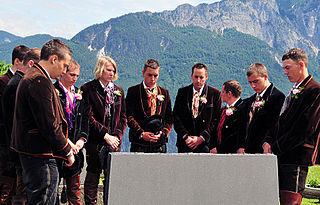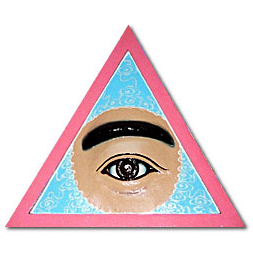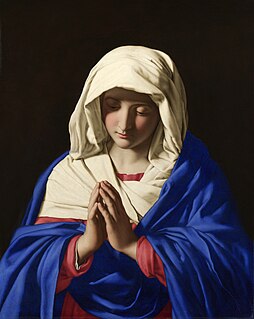
Prayer is an invocation or act that seeks to activate a rapport with an object of worship through deliberate communication. In the narrow sense, the term refers to an act of supplication or intercession directed towards a deity, or a deified ancestor. More generally, prayer can also have the purpose of thanksgiving or praise, and in comparative religion is closely associated with more abstract forms of meditation and with charms or spells.

Religious pluralism is an attitude or policy regarding the diversity of religious belief systems co-existing in society. It can indicate one or more of the following:

Worship is an act of religious devotion usually directed towards a deity. For many, worship is not about an emotion, it is more about a recognition of a god. An act of worship may be performed individually, in an informal or formal group, or by a designated leader. Such acts may involve honoring.

A moment of silence is a period of silent contemplation, prayer, reflection, or meditation. Similar to flying a flag at half-mast, a moment of silence is often a gesture of respect, particularly in mourning for those who have died recently, or as part of a tragic historical event, such as the September 11 attacks of 2001.

Caodaism is a monotheistic syncretic new religious movement officially established in the city of Tây Ninh in southern Vietnam in 1926. The full name of the religion is Đại Đạo Tam Kỳ Phổ Độ.
The adhan is the Islamic call to prayer, recited by a muezzin at prescribed times of the day. The root of the word is ʾadhina أَذِنَ meaning "to listen, to hear, be informed about". Another derivative of this word is ʾudhun (أُذُن), meaning "ear".

An Internet forum, or message board, is an online discussion site where people can hold conversations in the form of posted messages. They differ from chat rooms in that messages are often longer than one line of text, and are at least temporarily archived. Also, depending on the access level of a user or the forum set-up, a posted message might need to be approved by a moderator before it becomes publicly visible.
"Separation of church and state" is paraphrased from Thomas Jefferson and used by others in expressing an understanding of the intent and function of the Establishment Clause and Free Exercise Clause of the First Amendment to the United States Constitution which reads: "Congress shall make no law respecting an establishment of religion, or prohibiting the free exercise thereof..."

In Islam, Juma is the holiest day of the week on which special congregational prayers are offered. Fridays are considered a celebration in their own right and Muslims take special care in wearing clean clothes, bathing, and preparing special meals on this day. Friday prayers take place in the afternoon before the Zuhr prayer. The term Jumu’ah is derived from the same root from which jama'a is derived, which means "the gathering of people." In many Muslim countries, the weekend is inclusive of Fridays, while in others, Fridays are half-days for schools and some workplaces.

Buddhism is the second largest religion in Malaysia, after Islam, with 19.8% of Malaysia's population being Buddhist although some estimates put that figure at 21.6% when combining estimates of numbers of Buddhists with figures for adherents of Chinese religions which incorporate elements of Buddhism. Buddhism in Malaysia is mainly practised by the ethnic Malaysian Chinese, but there are also Malaysian Siamese, Malaysian Sri Lankans and Burmese in Malaysia that practice Buddhism such as Ananda Krishnan and K. Sri Dhammananda and a sizeable population of Malaysian Indians.
In United States law, the Establishment Clause of the First Amendment to the United States Constitution, together with that Amendment's Free Exercise Clause, form the constitutional right of freedom of religion. The relevant constitutional text is:
Congress shall make no law respecting an establishment of religion, or prohibiting the free exercise thereof...
The Aetherius Society is a new religious movement founded by George King in the mid-1950s as the result of what King claimed were contacts with extraterrestrial intelligences, to whom he referred as "Cosmic Masters". The main goal of the believer is to cooperate with these Cosmic Masters to help humanity solve its current Earthly problems and advance into the New Age.
The National Day of Prayer is an annual day of observance held on the first Thursday of May, designated by the United States Congress, when people are asked "to turn to God in prayer and meditation". The president is required by law to sign a proclamation each year, encouraging all Americans to pray on this day.
A Religion and spirituality podcast also known as a Godcast, iGod, Cyber Sermon, or Pod Preacher is a genre of podcast that covers topics related to religious and spiritual beliefs and is often done as a sermon, prayer, or reading of a religious text. The genre encompasses all religions and spiritual beliefs, but the most common religion and spirituality podcast topic is Christianity. The genre was influenced by televangelism and early examples of religion and spirituality podcasts included radio shows by televangelists that had been released in a podcast format.

In the Catholic Church, prayer is "the raising of one's mind and heart to God or the requesting of good things from God." It is an act of the moral virtue of religion, which Catholic theologians identify as a part of the cardinal virtue of justice.

Muslims constitute 96 percent of the population of the Gambia according to the CIA World Factbook, making Gambia a Muslim majority country. The vast majority are Sufi Sunnis influenced with Sufism, of which the main orders represented are Tijaniyah, Qadiriyah. Except for Ahmadiyya, Sufi orders pray together at common mosques. A small percentage of Muslims, predominantly immigrants from South Asia, do not ascribe to any traditional Islamic school of thought.

The Gmail interface makes Gmail unique amongst webmail systems for several reasons. Most evident to users are its search-oriented features and means of managing e-mail in a "conversation view" that is similar to an Internet forum.

Joshua DuBois is an executive and former government official who served as the head of the Office of Faith Based and Neighborhood Partnerships in the Executive Office of the President of the United States from 2009 to 2013. In February 2013 he stepped down to write a book of devotionals based on the ones he sends Obama, start a consulting firm, and become the weekly religion and community solutions columnist for Newsweek and The Daily Beast. DuBois has been included among "The Root 100" and Ebony Magazine's "Power 150" lists of the most influential African Americans in the country. He also appeared on the cover of Christianity Today magazine as one of the 33 most influential Christian leaders under 33. In September 2017 it was announced that DuBois would become a CNN Contributor.

Salah, also known as namāz and also spelled salat, are prayers performed by Muslims. Facing the qibla, the direction of the Kaaba with respect to those praying, Muslims pray first standing and later kneeling or sitting on the ground, reciting from the Quran and glorifying and praising Allah as they bow and prostrate themselves in between. Salah is composed of prescribed repetitive cycles of bows and prostrations, called rakat. The number of rak'ahs, also known as units of prayer, varies from prayer to prayer. Ritual purity and wudu are prerequisites for performing the prayers.
Town of Greece v. Galloway, 572 U.S. 565 (2014), is a United States Supreme Court case in which the court decided that the Town of Greece, New York may permit volunteer chaplains to open each legislative session with a prayer. The plaintiffs were Susan Galloway and Linda Stephens, represented by Americans United for Separation of Church and State. They argue that the prayers violate the Establishment Clause of the First Amendment to the United States Constitution. The United States Court of Appeals for the Second Circuit ruled against the town, and on May 20, 2013 the Supreme Court agreed to rule on the issue. On May 5, 2014, the U.S. Supreme Court ruled 5–4 in favor of the Town of Greece, holding that the town's practice of beginning legislative sessions with prayer did not violate the Establishment Clause of the First Amendment.











